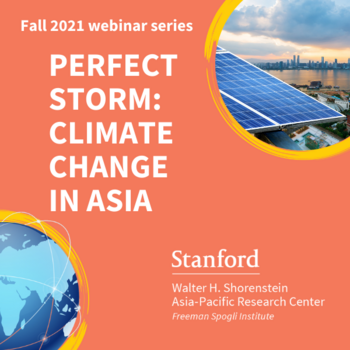Master's Program Alumni Continue to Shape Energy Policy in the Yucatan Peninsula
Every year, students in our Ford Dorsey Master’s in International Policy are given assignments in the Policy Change Studio. This unique aspect of the coursework partners students with government programs, NGOs and foundations across the globe to give them opportunities to solve problems and gain experience working on policy issues in a hands on, on-the-ground way.
In 2021, Serage Amatory, Hallie Lucas, Samantha Lee and Angela Ortega Pastor were partnered with a project at the U.S. National Renewable Energy Laboratory (NREL) focused on finding ways to help micro, small and medium sized businesses in the Yucatan Peninsula of Mexico access affordable, clean energy.
After a year of hard work, we checked in with Hallie and Angela to see how the project they started as students has grown and what has come of their efforts. As alumni of FSI, Hallie is now a formal employee at NREL, and Angela continues to support the partnerships their student group formed with the NREL team and local community members in Mexico in a personal capacity.
How did you initially get involved with the NREL group and their work on the Yucatan project?
Hallie Lucas: Our MIP practicum team was initially introduced to this effort in January 2021, through a challenge from NREL to “advance clean, affordable, and reliable energy for micro, small, and medium-sized businesses (MiPyMEs) in the Yucatan region of Mexico as part of our master’s capstone project.
Angela Pastor: We set out to scope the problem and connected with stakeholders on the ground. Throughout our project, it was very important for us to connect with local partners and to listen to the needs of the businesses we were trying to help.
Lucas: Through focused and intentional stakeholder discussions, it became apparent that access to affordable finance and technical knowledge gaps were the greatest barriers to energy efficiency and DPV adoption within the region. We also identified that behind-the-meter technologies like distributed photovoltaics (DPV) could be used as an energy and cost-savings mechanism to reduce grid-scale power emissions and empower consumer agency in addition to the enhancing consumer reliability.
Pastor: Since we graduated from MIP, we have continued to work with NREL and our local partners at the Instituto Yucateco del Emprendedor (IYEM) and the Instituto Tecnologico Superior Progreso (ITSP) to build what we are calling the MIPyMEs Futuros Verdes program. Currently the program has launched with a pilot in Merida, Yucatan supported by the Government of the State and IYEM, which really is a testament to the commitment and perseverance of our partners in Yucatan who have relentlessly believed in our vision and helped us push it through to this pilot phase.
What were some of the challenges of this particular project, and what excited you about this work?
Lucas: The challenge with this work was to demonstrate two critical components of our theory of change: 1) that the energy DPV and energy efficiency investments were sufficient to offset the initial cost of the loan within a reasonable time period for MiPyMEs and 2) that we could successfully de-risk lending to applicants with minimal or no credit history through this alternative credit mechanism.
Pastor: It definitely took a while for us to land on the root cause of the energy access issue in the Peninsula, and we did a lot of technical scoping work early in the process, and those co-creation workshops where we got input and feedback from partners on the ground was critical for us to finally read that, “ah, ha” moment.
We eventually realized that the key issue was not a lack of technical options, but rather a lack of access to affordable finance to invest in these interventions. We also realized that most businesses are connected to the grid and as such, while some will benefit from distributed solar generation systems, this will not be the case in general. Instead, focusing on bringing awareness and introducing energy efficiency and conservation measures is key to helping more businesses lower their electricity bill burden. The cheapest megawatt, after all, the one you don’t use.
In the year you’ve been working with NREL, how has this project grown and changed? What’s are some of the victories? What areas are you still working to make better?
Pastor: When we started this project, we had no idea what it would turn out to be. It was a class project, a challenge that we had to come up with a solution for. I don’t think any of us thought we would get to actually implement our idea. But today MIPyMEs in the Yucatan are able to get a free energy audit and apply to MicroYuc Verde for an affordable line of credit that enables them to both reduce their energy consumption and grow their business.
Lucas: I also see the multi-stakeholder coalition we’ve built as a major team victory – working with local government leaders, researchers, and changemakers in this space is really encouraging.
Pastor: We are also working to scale up the program and develop energy audit training modules that other local institutions across Mexico will be able to use to offer free energy audits to businesses. Receiving the endorsement of the Governor of Yucatan was a great win for the program. And as Hallie mentions, the multi-stakeholder coalition we have built is a true victory, and something that makes me confident that the program will continue.

How do you hope to see this project continue to develop in the coming years?
Lucas: In the next phase of this project, NREL, IYEM, and ITSP are working to develop a robust technical training curriculum for university students to conduct energy efficiency audits for local businesses seeking to reduce their energy consumption. Student and university-led technoeconomic analysis will support data-driven decisions on investment and lending and will equip students with the advanced skill set they need to succeed in a clean energy futures workforce. These targeted training materials and analytical tools will be made publicly available when complete.
Pastor: I would love to see this project grow in its pilot phase to offer more audits and microloans to MIPyMEs in the Yucatan, and even go beyond Yucatan to other Peninsula states, as I truly think it can make a different.
And at a higher-level, I am really looking forward to seeing whether our theory of change is legitimate – if we can prove that SMEs can leverage affordable financing to access clean energy that would be consequential for broader energy transition efforts around the globe.
How did having the chance to work on a project like this as a Ford Dorsey Master’s in International Policy student impact your studies and how you think about your role and future in the world of policy and international development?
Pastor: Getting the chance to work on a project like this has definitely shaped the type of work and impact I want to have. I am currently working in the sustainable finance space, as I really believe that part of the key to achieving our climate goals lies with closing the mitigation and adaptation finance gap, and especially focusing on bringing financing solutions to those who are often left behind by the system.
Lucas: I’ve been prompted to reflect more about institutionalized and systemic barriers to energy equity, as well, and to think more critically about what inclusive clean energy transitions look like in practice. The next several decades are humanity’s most critical – as the entire world mobilizes to combat the climate crisis, global energy and economic structures will be fundamentally transformed. In this, we have an unparallel opportunity to choose – and create – a better, more inclusive, more sustainable, future.
What are each of you hoping to do next in your careers?
Pastor: I hope to keep growing my knowledge of climate finance and to keep working to make an impact and accelerate climate transition efforts around the world. It’s been so moving to see the passion and commitment everyone we have worked with has shown. The fact that some of the Yucatan participants would take two days out of their busy schedules to come together to discuss what could be done to solve this problem is very inspiring. And even since our initial investigations have ended, they have continued to show up for the project, and are very much driving it forward at this point. It is truly great to see them believe in our vision for a clean energy future
Lucas: I agree. I want to keep doing what I am doing now!
The Ford Dorsey Master's in International Policy
Want to learn more? MIP holds admission events throughout the year, including graduate fairs and webinars, where you can meet our staff and ask questions about the program.
Read More

As alumni of the Ford Dorsey Master's in International Policy at the Freeman Spogli Institute for International Studies, Angela Ortega Pastor and Hallie Lucas continue their efforts to bring clean, affordable energy to businesses in Mexico.














